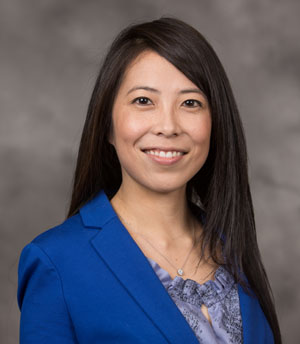Somin Lee receives AFOSR Young Investigator Award for research in bioplasmonics
The award supports research that will help our understanding of how tissues form distinct shapes and structure to become organs, such as lungs, salivary glands, and mammary glands.

 Enlarge
Enlarge
Prof. Somin Eunice Lee received a Young Investigator Award from the Air Force Office of Scientific Research (AFOSR) to support research that will ultimately help our basic understanding of how tissues form distinct shapes and structure to become organs, such as lungs, salivary glands, and mammary glands. This understanding will facilitate new strategies to engineer replacement tissues.
More specifically, she is developing novel tools, including an optomechanical plasmonic nanoantenna, to measure the temperature of proteins in cells. Her project is entitled, “Sub-Diffraction Temperature Mapping of Protein Interconversions.”
Prof. Lee directs the Bioplasmonics Group, which focuses on advancing innovations in nanoscale-dependent properties to enable unique spatial and temporal capabilities needed for quantification in bioscience and medicine. Her group works at the interface between life science, physical science and engineering, drawing from a combination of bottom-up and top-down nanofabrication approaches, to design and develop smart biophotonic technologies to uncover biological complexities in development and in cancer.
She received her bachelor’s and master’s degree in Electrical Engineering from University of California, Davis, and her Ph.D. in Bioengineering from University of California, Berkeley. Before coming to Michigan in 2014, Prof. Lee was a postdoctoral fellow at Lawrence Berkeley National Laboratory. In addition to her primary appointment in Electrical and Computer Engineering, she is an assistant professor of Biomedical Engineering and Applied Physics, and is affiliated with the Biointerfaces Institute.
Prof. Lee received an NSF CAREER Award , and is author of two U.S. Patents.
*******************
AFOSR Press Release (1/14/16)
The AFOSR Young Investigator Program was initiated in 2006. It is open to scientists and engineers who have received their PhD or equivalent within the past five years, and show exceptional ability and promise for conducting basic research. The objective of the program is to foster creative basic research in science and engineering, enhance early career development of outstanding young investigators, and increase opportunities for the young investigators to recognize the Air Force mission and the related challenges in science and engineering.
This year, 56 scientists and engineers from 41 research institutions will receive $20.6M in grants.
 MENU
MENU 
